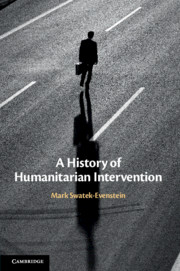'A masterpiece of intellectual history. In his provocative and insightful reconstruction of the doctrine and practice of humanitarian intervention, Mark Swatek-Evenstein transcends boldly and elegantly the boundaries between law, history and politics, and examines the narrative foundations of one of the most controversial issues in international law. This important book challenges conventional accounts of the international legal order, its past and present.'
Alexandra Kemmerer - Max Planck Institute for Comparative Public Law and International Law
'Do we have to watch passively dictators slaying their population, respecting the sovereignty of this state, or do we have an obligation to intervene for moral or even legal reasons? Drawing on a rich array of sources in several languages, Swatek-Evenstein analyzes the emergence of a legal discourse of ‘humanitarian intervention’. By pointing to the constructed nature of the doctrine that developed out of this discourse, the book offers a fresh perspective on the legal and political debates surrounding cross-border military interventions undertaken in the name of human rights. This is an indispensable work for scholars and students of international law, global history, genocide studies, and human rights that challenges assumptions about international responses to national crises.'
Mathias Schmoeckel - Executive Director of the Institute of German and Rhenish Legal History and Civil Law, University of Bonn
'The legitimacy and legality of humanitarian interventions still pose considerable controversy in international law. By offering us an in-depth analysis of the history of humanitarian interventions and their respective justifications, the author provides many instructive insights into what is at stake when we talk about international law, its use and its misuse. This book is a very worthwhile read.'
Gerd Hankel - Hamburg Foundation for the Advancement of Research and Culture
'A complete intellectual history of humanitarian intervention requires more than the reconstruction of international legal doctrines. An exacting account would historicize the notion of ‘the humanitarian’, and examine how and why it is mobilized by politicians and justified by international lawyers to legitimise invasions of other countries. Mark Swatek-Evenstein’s brilliant A History of Humanitarian Intervention casts an unsentimental eye on this controversial and all-too-current topic to explain what we are doing when we invoke humanity and mass atrocity in international law and relations.'
A. Dirk Moses - University of Sydney
'This is the product of an extremely sophisticated academic exercise not only about the history of humanitarian intervention but also about its development parallel to the development of an international legal framework. Although the book is written by a legal scholar, his interdisciplinary research method and analysis reflect an academic outcome that serves the purposes of the current multilayer scholarly environment. This book should be an indispensable reference for legal historians, international lawyers, experts in international relations and everyone who is interested in the overlap between law, politics and history. Swatek-Evenstein's lucid scholarship sheds light into pertinent legal developments in the field of humanitarian intervention and for this reason this is a book of great importance and relevance.'
Maria Varaki - King’s College London
'A thoughtfully argued, rigorously researched, and lucidly written account of the emergence of 'humanitarian intervention' in modern history and international law. Swatek-Evenstein combines pithy case-studies of interventions over the past two centuries with a highly nuanced reading of the legal and political debates surrounding this enduringly controversial concept.'
Adam Jones - University of British Columbia
'It is true that that the literature on humanitarian intervention is voluminous, but this book nonetheless adds a new dimension to it through the novel focus it adopts. […] It will provide fresh, challenging insights for any student of humanitarian intervention specifically, but international law more generally.'
Source: Liverpool Law Review
‘It will provide fresh, challenging insights for any student of humanitarian intervention specifically, but international law more generally.’
Gary Wilson
Source: Liverpool Law Review



